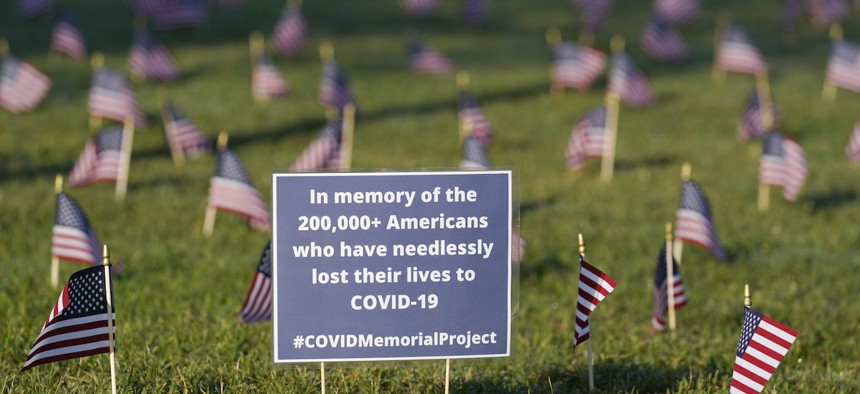Coronavirus Death Toll Passes 200,000

Activists from the COVID Memorial Project mark the deaths of 200,000 lives lost in the U.S. to COVID-19 after placing thousands of small American flags places on the grounds of the National Mall in Washington, Tuesday, Sept. 22, 2020. Associated Press
STATE AND LOCAL NEWS ROUNDUP | CDC advises against trick-or-treating ... Wisconsin judge grants voters extra time to return mail-in ballots ... Alaskan dog-sled race will kick off as scheduled despite pandemic.
The death toll from the coronavirus in the United States passed 200,000 on Monday, far eclipsing early projections from public health experts and President Donald Trump and edging into the worst-case scenario discussed in March by federal health officials. The death toll is equal to having the Sept. 11 terrorist attacks occur daily for 66 days, or nearly 2.5 times the number of soldiers who died in battle in the Vietnam and Korean wars combined. The milestone, reached Tuesday afternoon, comes as cases are rising after a months-long decline, particularly in college towns and rural areas in the South and the Midwest. As temperatures cool and flu season looms, indoor activities are likely to increase, prompting concerns among health officials about the state of the pandemic in the coming months. Dr. Anthony Fauci, director of the National Institute of Allergy and Infectious Diseases, said Tuesday that his ideal scenario would have cases plummeting as the nation heads into fall and winter. “I’d like to see us go into that at such a low level that when you have the inevitable cases you can handle them,” he told CNN. “We can’t throw our hands up and say, ‘It’s hopeless, it’s going to happen anyway.’ That is unacceptable to take that approach, but on the other hand, it’s not acceptable to not realize that we are entering into a risk period and we’ve got to act accordingly.” [New York Times, CNN]
SMOKE SIGNALS | The fire department and the public school system in Washington D.C. are launching an educational campaign to remind students and their families of the importance of working smoke detectors after multiple teachers reported that the incessant chirping of dying smoke alarms was disrupting virtual classes. The fire department can provide and install a limited number of free smoke detectors for families who can’t afford to purchase their own and can also provide replacement batteries. [Washington Post]
PANDEMIC-OR-TREAT | Costumes with masks, door-to-door trick-or-treating and parties are discouraged on Halloween this year due to the ongoing Covid-19 pandemic, the Centers for Disease Control and Prevention said Tuesday. "Many traditional Halloween activities can be high-risk for spreading viruses," the agency said in its holiday guidance, which also includes tips for Día de los Muertos and Thanksgiving. "There are several safer, alternative ways to participate in Halloween." Low-risk activities include decorating your home, having a virtual Halloween costume contest or carving and decorating pumpkins (with members of your household indoors, or “outside, at a safe distance, with neighbors or friends”). [CNN]
BALLOT EXTENSION | Voters in Wisconsin will have an extra six days to return their absentee ballots to election clerks, a federal judge ruled Monday. The decision, written by U.S. District Court Judge William Conley, allows votes to be counted if the ballots are postmarked by Nov. 3, which is Election Day, and received by clerks by Nov. 9, a departure from normal rules, which requires clerks to have the ballots by the time the polls close. Conley stayed his ruling for a week in anticipation of an appeal. If his decision is upheld, final results for the presidential election could be delayed for a week after Election Day, given Wisconsin’s status as a swing state. [Milwaukee Journal Sentinel]
IDITAROD IS ON | The 2021 Iditarod Trail Sled Dog Race will continue as scheduled in March, race officials announced. So far, 61 teams have signed up for the 1,000-mile competition, which begins in Anchorage and concludes in Nome, Alaska. Race officials said they plan to work with an infectious disease epidemiologist from Emory University to develop proper safety guidelines during the ongoing coronavirus pandemic. Officials will also consult with local health officials, veterinarians and village leaders to determine whether racers will stop in communities along the route, as they would in a normal year. [Alaska Public Media]
Kate Elizabeth Queram is a staff correspondent for Route Fifty and is based in Washington, D.C.
NEXT STORY: Successful contact tracing: Setting up, scaling and advancing operations





